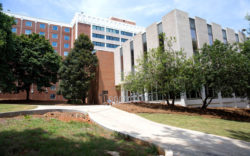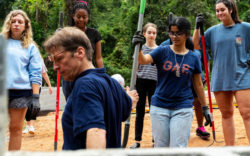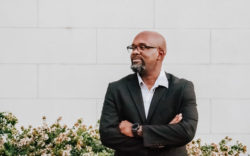Local activists, including several Athens-Clarke County commissioners, are ratcheting up pressure on the University of Georgia to acknowledge the legacy of slavery on campus and make reparations after the premiere of a documentary about the slave remains unearthed during construction at Baldwin Hall.
Following the screening of Below Baldwin on Mar. 31 at the Morton Theatre—attended by more than 400 people—director Joe Lavine, a recent UGA graduate, and narrator Broderick Flanigan led a discussion on the film’s themes. Panelists included Fred Smith Sr., Linda Davis, Linda Lloyd and ACC Commissioner Mariah Parker, who were interviewed for the documentary, as well as Charlottesville, VA city councilman Wes Bellamy.
The film lays out a case that university administrators have ignored calls to address the fact that slaves lived and worked on campus, and its low wages contribute to high poverty in Athens that persists to this day, especially among African Americans.
Local political organizations are drafting a letter to UGA President Jere Morehead demanding that the university take responsibility for its role in white supremacy, fund a faculty-proposed Center of Slavery to further research the university’s history of slavery and oppression, and provide reparations by granting full-tuition scholarships to descendants of enslaved people who worked on UGA’s campus and for African-American students who graduate from an Athens public high school, as well as paying all employees a minimum of $15 an hour.
“Minimum wage is a slave wage,” said Lloyd, executive director of the Athens Economic Justice Coalition. “You can’t make it on $7.25 an hour. A job should keep you out of poverty, not in it.”
The letter is scheduled to be delivered to Morehead on Wednesday, Apr. 10, according to Lavine.
When he was vice mayor of Charlottesville, Bellamy said he threatened to cut off water and other city services to a University of Virginia-Virginia Tech football game. Ultimately, that’s what brought the University of Virginia to the table to negotiate, he said.
Bellamy said the African-American community cannot receive reparations without the university and commission reallocating resources. “You show me how much you care about people by your budget,” he said. “If your budget is not going to the people most in need, you are showing that you don’t care about those who are most in need.
“It’s just all about having the political will to say, ‘I’m willing to sacrifice re-election to do what’s right,’” he said.
So far, Parker, Denson and Link have confirmed they’ve signed or plan on signing the open letter to Morehead. However, Girtz told Flagpole he is not signing the letter.
“My priority is having Athens-Clarke County’s house in order in a way in which we fully reckon with our past—particularly pertaining to sins of institutional racism and marginalization of members of this community—for the openness and good of the moment and to set the stage for rewarding years ahead for all residents of Athens. I hope our work [is] an inspiration to other institutions, including our neighbor UGA,” Girtz told Flagpole in an emailed statement.
Bellamy said it would take the whole commission, including the mayor, to put pressure on the university. He said he had lunch with Girtz and believes the Athens mayor wants to be on “the right side.”
“If that’s the case, the first signature needs to be from Mayor Kelly [Girtz],” Bellamy said. “This is not the situation you can play both sides of the fence… We must become comfortable with the uncomfortable. Mayor Kelly Girtz and the commissioners, with their leverage, have to take a stance and have to make the university uncomfortable to push them to do what is right.”
For the panelists from Athens, the issue is also personal. “We can trace my family back to the late 1700s and early 1800s,” Smith said. “That’s when Athens and UGA started. My folks may very well be buried there. In a sense, that’s my family cemetery,” Smith said. “UGA treated this [the cemetery under Baldwin Hall] as a construction site.”
As the documentary points out, the university originally said the remains were believed to be “of European descent.” After DNA testing, UGA acknowledged the remains tested were primarily African-American. Despite the fact that the Jackson Street or Old Athens Cemetery fell into disuse shortly after the Civil War, the university has never officially acknowledged that enslaved individuals were likely buried in poorly or unmarked graves at the cemetery.
Baldwin Hall was built on top of those graves in the 1930s, and no one knows for sure where the remains found then were reinterred. In 2017, UGA chose Oconee Hill Cemetery on the advice of the state archaeologist. But some members of Athens’ black community, like Smith and Davis, advocated for the remains to be buried at Brooklyn Cemetery or Gospel Pilgrim Cemetery, both of which are African-American gravesites originally founded in the late 19th Century because free black residents did not want to be buried in paupers’ graves in undesirable parts of white cemeteries, as was the practice at Oconee Hill at the time.
Smith said he is still upset today because there were never “any earnest conversations” between the local black community and the university. It appears those conversations are coming, whether UGA likes it or not.
Like what you just read? Support Flagpole by making a donation today. Every dollar you give helps fund our ongoing mission to provide Athens with quality, independent journalism.










